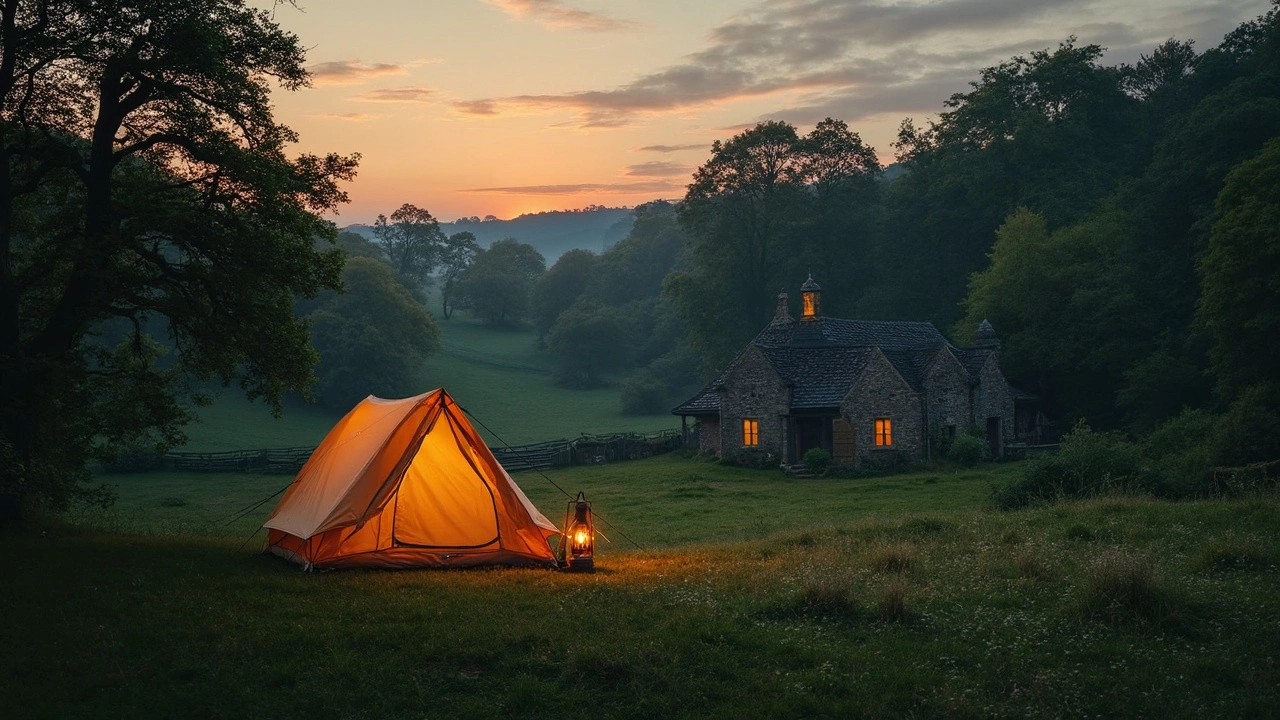So, you're thinking about wild camping in England? Before you pack your gear and head into the countryside, there are a few things you should know. Wild camping can be an amazing way to connect with nature, but unlike in places like Scotland, it's generally not legal across most parts of England. Simply put, without the landowner's permission, you might be treading on the wrong side of the law.
But, this doesn't mean it's completely off the cards. There are some places where it's more tolerated, though you should be prepared for the possibility of being moved on, or even fined. Councils can issue fines, especially if you leave a mess or disturb the environment, so it's best to camp discreet, leave no trace, and maybe try to blend in like a stealth camper.
And let's not forget — always check for local rules specific to the area before you pitch your tent. Some national parks and open-access land may have their unique regulations. Being informed is your best bet for a hassle-free adventure in the UK's beautiful landscapes.
- What is Wild Camping?
- Legal Aspects and Potential Penalties
- Tips for Responsible Wild Camping
- Alternatives to Wild Camping
What is Wild Camping?
So, if you've ever wondered about wild camping, it's basically camping in the great outdoors without the hustle of formal campsites. Imagine finding a secluded spot in nature, far from the crowds, and pitching a tent to soak in the tranquility. Sounds dreamy, right? In many places, it's a way to reconnect with nature in its rawest form.
But here's the kicker—it’s not as straightforward in England compared to, say, Scotland. The Land Reform (Scotland) Act 2003 gives you the right to roam, allowing wild camping pretty much anywhere on unenclosed land. In England, however, wild camping mostly means you're setting up on private property without explicit permission. Yeah, it can be a bit dicey.
Why Do People Choose Wild Camping?
Folks are drawn to wild camping for different reasons. For one, it's the thrill of adventure and solitude, away from the buzzing campsites and caravans. Some crave the rugged experience, wanting to test their survival skills. Others love it for the pure freedom it offers, letting you choose your perfect sleep spot under the stars, waking up to picturesque views.
Wild Camping vs. Traditional Camping
Let’s break down the differences. Traditional camping usually involves campsites with facilities like toilets, showers, and maybe even Wi-Fi. Wild camping, on the other hand, leaves you fending for yourself—think no running water or electricity. It’s a complete unplugged scenario!
There’s a certain charm in not knowing where you'll lay your head next. Your accommodation is where you decide to stop; it’s spontaneous and liberating. Of course, this requires a bit more prep and responsible camping habits since you're accountable for everything, from waste disposal to water sourcing.
- Pros: Solitude, flexibility, direct connection to nature.
- Cons: Legal challenges, lack of facilities, environmental impact risks.
So, whether you're looking for adventure or just a getaway into nature, wild camping can be a unique experience. Just make sure you're clued up about the do’s and don’ts—after all, nobody wants a surprise fine!
Legal Aspects and Potential Penalties
When it comes to wild camping in England, it's crucial to understand the laws that govern this seemingly free-spirited activity. Generally speaking, wild camping is illegal on private land without permission. This means that pitching your tent on a farmer's field or a gorgeous hilltop could potentially land you in legal hot water.
In England, most land is owned by someone. Unlike Scotland, where wild camping is more lenient thanks to the Land Reform Act, land in England is primarily privately owned. If you're caught without permission, the landowner has the right to ask you to pack up and leave. If you fail to comply, authorities could get involved, and fines can be issued. While fines aren't always strictly enforced, especially if you haven't caused any harm, they are still a possibility.
Common Penalties
- Fine: Local councils in places like the Lake District have the authority to issue fines for illegal camping. These fines can vary, but typically, they're around £100.
- Eviction: More often than not, if you're found in an unauthorized camping spot, you'll simply be asked to leave. It's less about punishment and more about maintaining order.
Exceptions and Permissions
There are a few exceptions to the rule, such as Dartmoor National Park, where some areas allow wild camping without explicit permission. Even there, though, certain rules apply, like staying away from roads and buildings and limiting your stay to one or two nights.
If you really want to camp on a specific piece of land, seeking permission from the landowner is your safest bet. Many landowners might be agreeable, especially if you assure them that you'll leave the site as you found it.
Do your homework and be respectful of the land and its owners. This not only helps protect the environment but also keeps you out of trouble. Happy camping, and remember to leave no trace!

Tips for Responsible Wild Camping
Alright, if you're keen on wild camping in England without hassles, it's crucial to be a responsible camper. Respecting the land and the people around is not just good practice—it's essential to keep wild camping viable for others too. Here's how you can make sure you're camping responsibly.
Get Permission
First thing's first: always seek permission from the landowner. It might sound obvious, but many overlook this step. A simple ask can save you a lot of trouble later on. If you can't find the landowner, consider alternative locations like certain parts of Dartmoor where wild camping is allowed under specific conditions.
Leave No Trace
This might be the golden rule of camping: leave the campsite as if you were never there. Take all your rubbish with you, avoid damaging plants, and don’t set up campfires that could scorch the ground. Indeed, many wild camping fines in the UK arise from littering or fire damage, so be wary.
Keep a Low Profile
Being discreet goes a long way. Set up your tent late in the day and pack it up early in the morning. Choose colors that blend in with the surroundings, minimizing your visibility. Stealth camping can be a fun challenge in itself!
Respect Wildlife and Other Campers
Keep noise to a minimum to avoid disturbing local wildlife or any nearby campers. Use biodegradable products to prevent polluting water sources, and remember, feeding animals is a big no-no as it disrupts their natural habits.
Plan Your Toilet
Yep, it’s not glamorous, but it's essential. If there’s no toilet around, carry a small trowel to dig a "cathole". Make sure it's at least 15cm deep and 60 meters away from water sources. Cover it properly after use.
By following these simple yet effective tips, you'll not only have a great time wild camping but also help ensure that these breathtaking places remain open for future adventurers. So pack smart, tread lightly, and enjoy the raw beauty of the English countryside!
Alternatives to Wild Camping
So, if wild camping in England seems like a hassle or risk you don't want to take, what can you do instead? Luckily, there are plenty of great alternatives that can still give you that sense of freedom without the legal headaches.
1. Use Designated Campsites
Campsites are probably the most straightforward option. England boasts a wide variety of campsites, from basic spots with just the essentials to full-fledged, amenity-packed holiday parks. You'll find them scattered all over the countryside, which means fewer worries about fines and more focus on fun!
- Check online platforms for reviews of campsites near your destination.
- Book early, especially during peak seasons like summer.
- Consider sites with unique features, like lakeside spots or forest camps.
2. Try Glamping for a Touch of Luxury
If you're looking for something with a bit more comfort, glamping (that's glamorous camping) might be right up your alley. Think cozy beds inside stylish tents, or even treehouses perched among treetops. It combines the thrill of the great outdoors with the comfort of a hotel stay.
3. Leverage the Permission of Landowners
If you're set on that wild feel but want to stay legit, consider contacting local landowners. Sometimes, they'll let you camp on their land for a small fee. It's a win-win, as you get your own patch of nature legally, and they get a bit of extra cash.
4. Join Wild Camping Organizations
There are groups and clubs in the UK that organize legal wild camping events. Being part of these can open up opportunities to camp in areas that are usually off-limits to solo campers.
| Option | Description |
|---|---|
| Campsites | Legally safe, facilities available |
| Glamping | Luxurious experience, all comforts provided |
| Landowner Permission | Private arrangement, often more remote |
| Camping Clubs | Organized events, meet like-minded people |
Bottom line, while wild camping England style might be a bit tricky, there are still loads of ways to enjoy the great outdoors. Pick the right alternative for you and your adventure plans!
